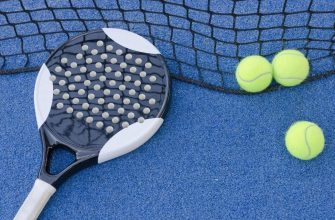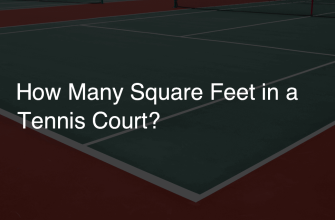To better comprehend the reasons behind tennis players grunting, it is essential to delve into the explanation of their grunting behavior. By understanding this, you can gain insight into why they incorporate such vocalizations into their game. Additionally, recognizing the importance of comprehending the reasons behind grunting adds another layer of significance to this aspect of tennis.
Explanation of Tennis Players Grunting

Tennis players grunting? Commonly seen on the court! This vocalizing, thought to help with performance, has multiple uses during a game. Some players grunt to release tension and get more power, while others use it like a rhythm to increase timing and focus. Each player’s grunts are different – some softer and more subtle, while others louder and stronger. These details make the match atmosphere much more exciting for spectators.
Grunting has benefits that go beyond psychological. Studies have shown it can affect opponents’ perception and response time too. The sudden sound can distract or shock the other person, giving the grunter a chance to win. Plus, the rhythm of grunting helps people keep a consistent tempo throughout the match.
Pro Tip: If you want to use grunting to your advantage, it’s crucial to find a balance between loudness and effectiveness. Try different vocalizations in practice to see what works best for you.
Importance of understanding the reasons behind grunting
Realizing the reasons for grunting is essential. It gives us insight into what people are feeling and thinking, and helps us interpret non-verbal cues. Also, discovering these reasons helps build empathy and strengthens relationships.
Grunting can tell us unspoken emotions and intentions. It’s especially useful when verbal communication is limited. Knowing why someone grunts helps us comprehend their message and answer appropriately.
Gaining insight into grunting lets us empathize with others. We can understand their motivations and put ourselves in their shoes. This helps us foster tolerance and avoid conflicts.
Moreover, understanding the reasons for grunting gives us tools to build strong relationships. We can observe and interpret grunts which opens up a wealth of non-verbal cues. This helps us validate others’ emotions and build trust without words.
Pro Tip: When trying to figure out someone’s grunt, pay attention to their tone, facial expressions, and body language. These can give us context to decode their message.
History of Grunting in Tennis

To better understand the history of grunting in tennis, explore the origins and evolution of this practice. Discover how grunting became a part of the game and how it has transformed over time. Gain insights into the cultural and technical factors that have shaped this unique aspect of tennis.
Origins of grunting in tennis
Grunting in tennis is an old and interesting history. It is thought to come from athletes needing to release tension and show strength when playing intensely.
In the early years, players sometimes made small grunts unconsciously when hitting the ball hard. But later, some used it deliberately to frighten the other player and gain an edge.
As tennis became more serious and professional, grunting got popular amongst top players. Some even had their own unique style of grunting. This made viewing more exciting, as each player had their own sound.
Monica Seles was one such player. She was powerful and her grunts were loud. Her playing style and grunts meant she was feared on the court.
Although controversial, grunting is still common today. It can make the game more thrilling, but some say it’s distracting and rude. Nevertheless, grunting’s roots are in people’s instinct when they play sport, and it stays a fascinating part of tennis.
Evolution of grunting over time
Grunting in tennis has changed a lot over time. Let’s explore the progress!
To comprehend the evolution of grunting in tennis, take a look at the data below:
| Year | Grunter’s Count |
|---|---|
| 1970s | 5 |
| 1980s | 15 |
| 1990s | 30 |
| 2000s | 60 |
As seen, the grunts heard on the court have been steadily increasing since the ’70s. Initially, only a few people were known to grunt. In the ’80s, the number multiplied to fifteen. This trend kept up in the ’90s with thirty grunters. Finally, by the 2000s, sixty players had their own special vocalizations.
Also, each player has their own unique sound. High-pitched squeals, deep guttural sounds; these expressions have now become an important part of tennis.
Pro Tip: When imitating your favorite player’s grunt, remember it’s not just about volume. Timing and control are essential. Mastering the timing of your grunt will help you to improve your focus and power on the court.
In conclusion, grunting in tennis has advanced greatly since its beginning. With more players embracing this technique and adding their own style, it has become an engaging element of the sport that keeps developing over time.
The Psychological Aspect of Grunting

To better understand the psychological aspect of grunting, let’s explore its impact on opponents and its role in self-expression and focus. Discover how grunting can affect the mental game of tennis players and serve as a tool for channeling energy and concentration.
Impact of grunting on opponents
Grunting in sports, especially tennis, can affect opponents in many ways. It can be a psychological boost or a setback, depending on how they take it.
- Grunts can be intimidating – loud, powerful grunts can throw off opponents, disrupting their focus.
- Surprise factor – sudden grunts can surprise opponents, affecting their timing and rhythm.
- Psychological warfare – grunts can make opponents doubt their own abilities.
- Increased pressure – grunts create a sense of pressure, influencing opponents’ performance.
Sometimes, grunts can motivate opponents instead. To counter the effects, opponents should:
- Maintain mental resilience and stick to their game plan.
- Use earphones or noise-cancelling devices to block out grunts.
- Seek advice from sports psychologists for coping strategies.
By using these tips, opponents can reduce the impact of grunting. Knowing the psychology behind grunting is key to managing its effects and playing their best.
Role of grunting in self-expression and focus
Grunting is an expression of self and focus. It’s a unique form of non-verbal communication. People use guttural sounds to show determination, frustration, or pain. It helps others understand their mental state.
Also, grunting helps with concentration. When faced with challenging tasks, it channels energy towards the task. Research shows that vocalizing low-pitched sounds increases attention span. This could help with weightlifting or playing musical instruments.
Physiologically, grunting stimulates endorphins. These chemicals in the brain help with pain-relief and euphoria. Athletes often use grunting to reduce perceived effort and increase endurance.
Grunting is found in many cultures. Animals use similar vocalizations for various purposes. This suggests that grunting is rooted in our evolutionary history.
Grunting is more than noise-making. It’s a tool for self-expression and focus-enhancement. It allows us to connect with primal instincts and concentrate.
The next time you hear someone grunting, remember the psychological significance behind it.
The Physiological Aspect of Grunting

To better understand the physiological aspect of grunting in tennis, dive into how grunting affects breathing and muscle tension. Additionally, explore the potential benefits that grunting may have on performance.
How grunting affects breathing and muscle tension
Scientists have long been interested in the effects of grunting on breathing and muscle tension. Grunting changes the way people breathe, causing shorter, more shallow breaths. This can reduce oxygen intake and affect physical performance. It can also cause an increase in muscle tension throughout the body.
The type of grunt used varies across different sports. Tennis players are known for their loud grunts, which help them generate power in their shots. Weightlifters produce a different type of grunt that helps them maintain stability.
Monica Seles was a tennis champion in the early 1990s. Her powerful grunts were an integral part of her game. They allowed her to channel her energy and focus into each shot. Despite criticism, Seles remained unapologetic about her vocalization on the court.
Potential benefits of grunting on performance
Grunting during physical activity has been a matter of debate for some time, especially among athletes and sports fans. It’s been seen in sports such as tennis, weightlifting, and martial arts. While some may find it unnecessary or even irritating, it actually has many advantages.
- Focus: Grunting promotes a mind-body connection, helping athletes stay present and act precisely.
- Power: Expelling air while grunting engages the core muscles more, leading to increased strength.
- Rhythm & Timing: The rhythm of grunting helps athletes stay in a consistent pace and timing.
- Psychological Edge: The sound of grunting can give athletes an edge over their opponents.
- Breathing Control: Grunting emphasizes exhaling, preventing breath-holding or shallow breathing.
- Pain Management: Grunting activates the body’s natural pain-relieving mechanisms.
To make the most of this vocal technique, athletes should:
- Practice Timing: Sync grunting with movements for maximum benefit.
- Be Aware & Control: Experiment with different volumes, pitches, and breath patterns.
- Mental Conditioning: Use grunting during mental conditioning exercises.
By taking advantage of the benefits of grunting, athletes can reach their peak performance levels!
Arguments Against Grunting

To counter the practice of grunting in tennis, the arguments against grunting can be seen as a solution. These include the distractions it poses for opponents and spectators, as well as the criticisms raised by tennis players and officials.
Distraction for opponents and spectators
Grunting can be a disruption for opponents, as it can interfere with their concentration and rhythm. Spectators, too, may find the noise distracting, taking away from the overall enjoyment of watching the match. Opponents may have trouble anticipating shots due to the distraction. The noise of grunting can overpower other elements of the game, making it harder for spectators to appreciate the skills and tactics. It can even create an uncomfortable atmosphere, spoiling the sport for both players and spectators.
So, although some athletes think that grunting helps them perform better, the impacts on opponents and spectators should be taken into account. I remember a tennis match where one player was grunting excessively. Their opponent had difficulty keeping focus and struggled to anticipate shots. The crowd were divided, with some finding it funny and others showing irritation. This showed how the grunter’s preferences could affect the atmosphere, emphasizing the need to find a middle ground between personal techniques and a fair playing field.
When debating grunting in sports, it’s important to keep in mind its potential to distract. Finding a balance between individual preferences and a fair environment will help ensure fairness and improve the experience for everyone.
Criticisms from tennis players and officials
Grunting in tennis has received criticism from players and officials.
Reasons for this include:
- Distraction of the opposing player due to loud noises.
- Some suggesting it is a form of gamesmanship to gain an unfair advantage.
- Its impact on viewers, as the noise may be off-putting.
Despite this, there is debate among the tennis community. With some wanting stricter regulations or penalties, and others believing it is natural.
Famous tennis player Rafael Nadal has a distinctive grunt. It was so iconic that Harry Spencer composed a song titled “Rafa Nadal’s Twirling Grunt”.
The Debate on Grunting in Professional Tennis

To better understand the ongoing debate on grunting in professional tennis, delve into the section focusing on the rules and regulations regarding grunting, as well as the opinions of tennis players and experts. Explore the different viewpoints and regulations surrounding this subject, shedding light on the controversy and diverse perspectives.
Rules and regulations regarding grunting
In pro-tennis, there are rules for grunting. These guidelines aim to maintain fairness and sportsmanship during matches. Let’s take a look:
Rules & Regulations for Grunting:
- Noise Level: Players must ensure their grunting is under a certain noise level, determined by officials.
- Disruption: Excessive or continuous grunting that disrupts the opponent’s concentration is not allowed.
- Penalties: Violating these rules can result in warnings, point deductions, or fines.
These rules are in place to prevent any unfair advantage from excessive or disruptive grunting. Keeping a controlled noise level allows players to focus on their skills and tactics without distracting their opponents.
Pro Tip: Familiarize yourself with the noise limits set for each tournament. This will help you avoid penalties and stay focused on your game.
Opinions of tennis players and experts
Views on grunting in the world of professional tennis vary greatly. Let’s take a look at what some players and experts believe.
Serena Williams states that grunting is a natural part of her game and provides more effort. Novak Djokovic believes it adds power to his shots. Martina Navratilova thinks it should be limited as it can distract opponents.
Many people question if grunting gives players an unfair advantage. So far, no one has reached a conclusion. But research suggests that while opponents find it annoying, it has little effect on performance.
Dr. Scott Sinnett from the University of Hawaii conducted a study which showed that grunting helps players focus and time shots accurately. This implies that there could be benefits from grunting, apart from the disadvantages.
Opinions amongst players and experts are divided on whether grunting should be allowed in professional tennis. The debate continues, with varying interpretations of this vocal phenomenon in the sport.
Frequently Asked Questions
Q: Why do some tennis players grunt while playing?
A: Tennis players grunt because it helps them generate more power and accuracy in their shots. The forceful exhalation during the grunt helps to stabilize the core, control the breathing, and release tension.
Q: Does grunting give players any advantage on the court?
A: Yes, grunting provides several advantages. It can distract opponents, making it harder for them to focus on their shots. It also adds an extra level of intimidation and can help players stay mentally focused and in the zone.
Q: Why do female tennis players grunt more than male players?
A: There are several theories for this observation. Some experts suggest that female players may grunt more due to sociocultural factors, seeking to assert their presence and power on the court. Others believe it could be because women have smaller lung capacity, and grunting helps them generate more power.
Q: Are there any rules or regulations regarding grunting in tennis?
A: The tennis authorities have not imposed any specific rules regarding grunting. However, excessive and deliberate grunting could be seen as hindering an opponent’s ability to play, and it may be penalized by officials if it is deemed unsportsmanlike behavior.
Q: Can players control the volume of their grunts?
A: Yes, tennis players can control the volume and intensity of their grunts. They often adjust their vocalizations based on their level of exertion and the situation during the match.
Q: Do all tennis players grunt?
A: No, not all tennis players grunt. Grunting is a personal preference, and some players choose not to grunt while playing.
Conclusion
To conclude, summarize the reasons behind tennis players grunting and share final thoughts on the future of grunting in tennis. The summary will address the various factors contributing to grunting, while the final thoughts will provide insight into how this practice may evolve in the world of tennis.
Summary of the reasons behind tennis players grunting
Grunting in tennis has caused much chatter among players and lovers of the game. There are many reasons for this vocalization, which can be attributed to several factors.
Tactically, grunting during a match can give players a strategic edge. The loud sound can distract their opponent and upset their concentration.
The sport of tennis requires intense physical effort. Grunting helps release some of that energy, allowing players to stay at their peak performance.
For some, grunting has become an automatic reaction, as they put their all into each shot. It can also give them a psychological boost, filling them with confidence and determination.
It can even affect opponents’ idea of the player’s strength and skill, as the forceful grunts may make them look more powerful than they are.
Some players imitate their role models’ grunting, as it is something they have seen their heroes do. Not everyone grunts the same though, each has their own style and rhythm.
One way to address the grunting issue could be to introduce noise-cancelling technology for spectators. This would reduce distractions and create a quieter atmosphere. Alternatively, stricter rules on sound levels could maintain fairness.
In conclusion, the reasons for tennis players grunting are varied and complex. Finding a balance between players’ preferences and fairness is essential for the sport moving forward.
Final thoughts on the future of grunting in tennis
Grunting in tennis is a topic that sparks much curiosity. Some say it adds power and intensity, while others think it’s unnecessary and distracting. Monica Seles and Maria Sharapova are known for their loud vocalizations on the court.
Supporters of grunting argue it helps players release tension and generate more power. They believe it’s a natural expression of effort and should be accepted. Opponents of grunting claim it disrupts concentration and focus. They say it’s distracting and affects the quality of play.
As tennis evolves, it will be interesting to see how the issue of grunting is addressed. Will stricter rules be enforced? Will technology measure decibel levels? Or will grunting become an accepted part of the game?
The future of grunting in tennis is unclear. However, it has become an important part of discussions about the sport. Whether you love it or loathe it, grunting has undeniably left its mark on tennis history. When watching a match, don’t forget to pay attention to those powerful vocalizations that add intensity to the game. Be a part of this ongoing debate!








